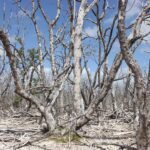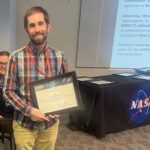By: Katelyn Newman
Publisher: Council on the Environment
Published: June 4, 2014
Dr. Sujay Kaushal has always loved water.
“I was inspired by growing up near streams and rivers during my childhood and an early appreciation and love of running waters,” said Kaushal, the 2014 recipient of the Council on the Environment’s Junior Faculty Award.
Over the past five years Kaushal has exemplified his commitment to freshwater health, collaborating with local and national water management officials as well as his graduate students to apply his research to the treatment of local waterways.
“Starting off as an undergrad, he was just a very exciting person to work for because he sees the big picture about how science can influence sustainability, and what questions we can ask for ways we can manage our waterways and landscapes to basically improve life for humans,” said Tamara Newcomer-Johnson, a current PhD candidate who has worked for Kaushal since 2006.
“I’ve watched other undergrad and grad students and seen that he really makes you work to find the answers,” said Newcomer-Johnson, who currently works for NOAA’s National Sea Grant Program. “He asks the questions, but doesn’t give you the answers- you have to solve them yourself.”
Kaushal currently works for the University of Maryland’s Department of Geology and Maryland Earth System Sciences Interdisciplinary Center (ESSIC), and his research focuses on the land use and climate impacts on water resources as well as urban watershed restoration.
Recently, Kaushal’s research has focused on the long term effects of salinization and alkalinization in freshwater, as well as how urban storm water systems should be treated as streams because all roadside chemicals that wash into them eventually end up in the oceans through hydrologic connectivity.
“Our research suggests that human activities have accelerated the weathering of rocks through acid rain, mining, and other human activities,” said Kaushal. “We need to limit the coverage by impervious surfaces in watersheds where practical, and we need to limit development in close proximity to streams, rivers and lakes.”
To apply the information he gains from his research to real-life situations, Kaushal has collaborated with EPA, USGS, NOAA, the NSF-supported Baltimore Long-Term Ecological Research site, DC Water, and the National Ecological Observatory Network.
“Specifically his work has informed the Chesapeake Bay program of the EPA on the effects of stream restoration, and has influenced the plans or guidance that the Chesapeake Bay program follows in regard to restoration for the whole Chesapeake Bay watershed,” said Dr. Paul Mayer, chief of the Ecological Effects Branch for the Environmental Protection Agency.
“Sujay is an extremely humble person, and despite that humility-well it’s because of the humility that I enjoy working with him, and he’s a close friend of mine- but despite that humility he’s really been a pioneer and leader in his field, and a major contributor to the scientific community,” said Mayer, one of Kaushal’s colleagues for the past 13 years.
“Sujay has the ability to translate scientific information into easily understandable information, and not talk over people’s heads,” said Steve Stewart, who works for the Department of Environmental Protection & Sustainability of the Watershed Management and Monitoring Section.
Kaushal’s research has been used by the Chesapeake Bay program expert panel on stream restoration, providing a mechanism to give credit for denitrification within stream activity, said Stewart. His work has helped managers decide how much restoration is needed without driving up costs.
“He’s really easy to work with, and actually listens to the management issues that are relevant to us,” said Stewart. “I really enjoy working with Sujay- he’s a fantastic guy.”
“Sujay has always recognized the importance of application, taking the research that he and his students have done and working with managers to apply it,” said William Stack, the Deputy Director of Programs for the Center for Watershed Protection. “He is the most practical and down-to-earth academic I’ve ever worked with.”
The ConE’s Junior Faculty Award gives recipients acknowledgement for their hard work as well as a $3000 prize. Kaushal said that he plans to use the award to “pursue further work on increased salinization and alkalinizaton of rivers” and their effects on ecosystems and aquatic biodiversity.
Reprinted from Council on the Environment with permission. http://cone.umd.edu/index.php/news-events/579-and-the-junior-faculty-award-goes-to-dr-sujay-kaushal.





